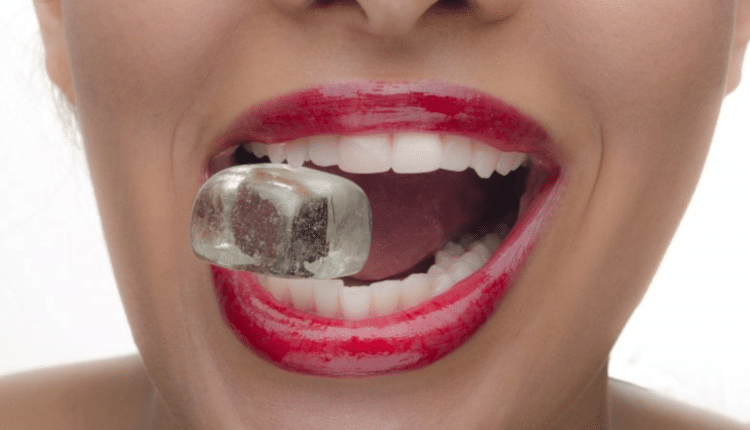Why Dentists Warn Against Chewing Ice
There are countless people who chew ice without realizing the harm that it can do to their teeth. It may seem harmless, but dentists would always warn patients that chewing ice is bad for teeth isn’t a myth—it’s an actual problem. The immense pressure exerted in breaking the ice can damage enamel, crack teeth, and even cause emergencies. In this article, we will come to understand why chewing ice bad for teeth is a warning you need to avoid, what are the risks, and how to stop the habit.
Why Chewing Ice is Destructive for Dental Health
Although ice is frozen water, its hardness is dangerous for teeth.
Damage to Tooth Enamel
Dentists explain that eating ice is harmful to teeth mostly because it erodes enamel. Tooth enamel is the hard outer layer that protects your teeth against sensitivity and decay. By repeatedly chewing ice, this enamel thins.
Once enamel is lost, it is gone. That makes your teeth susceptible to cavities and sensitivity. That’s why professionals highlight that chewing ice bad for teeth is something you ought not to do if you are hoping towards healthy oral health in the long term.
Risk of Cracks and Fractures
Another principal reason that chewing ice bad for teeth has to do with the risk of fractures and cracks. Chewing hard ice cubes causes pressure on the teeth, which develop small cracks. Over time, the cracks widen, resulting in fractures and pain.
Other patients who ignore the fact that ice chewing is unhealthy for teeth end up needing crowns, fillings, or root canals. Severe fractures may even require tooth extraction, proving the habit is quite far from innocent.
Irritation of Fillings and Gums
Chewing ice doesn’t only harm teeth—it can also irritate gums and damage dental work. If you’ve had fillings, crowns, or braces, the pressure from ice chewing can weaken or dislodge them. This is another example of why chewing ice bad for teeth is also bad for overall oral health.
Patients who have undergone this are usually in need of costly dental treatment. Ignoring the warning that chewing ice bad for teeth is dangerous can create a vicious cycle of dental problems which could have been avoided otherwise.
Breaking the Habit of Chewing Ice
Acknowledging that chewing ice bad for teeth is just the first step, but to change the habit may be challenging.
Identify the Underlying Cause
Some people chew ice as they are bored, while others are chewing ice due to a nutritional deficiency, that of iron deficiency. Dentists explain that by knowing these explanations, you will understand the reason why chewing ice bad for teeth is connected to underlying issues.
If your craving for ice is strong, it could be a condition called pagophagia, associated with anemia. Addressing this condition can stop the craving and reinforce the fact that chewing ice bad for teeth is not just about oral health, but also general health.
Find Healthier Alternatives
Stopping the habit does not mean you have to stop all cold sensations. Instead of ice, use cold water, cold fruit, or sugar-free popsicles. These alternatives affect craving without repeating the habit formed by chewing ice bad for teeth.
By replacing ice chewing with healthier tendencies, you protect your teeth but still have your cool cravings. This easy action prevents you from acquiring long-term problems introduced due to chewing ice bad for teeth since chewing ice bad for teeth has long-term impacts.
Seek Professional Help
There are situations in which sheer willpower cannot be used to halt the habit. Physicians and dentists can offer a treatment and plan of action if cravings feel uncontrollable. A professional can suggest filling nutritional deficiencies or recommending behavioral therapy.
This reminds us once more why chewing ice bad for teeth cannot be disregarded. Seeking help not only safeguards your smile but allows you to address the underlying reasons for the habit.
Final Thoughts
While it may seem innocent, the reality is that chewing ice bad for teeth is a dental and scientific reality. Enamel erosion, fractures, and irritation of the gums are just a few among the risks involved over the fleeting pleasure of crunching ice. By recognizing the risk and replacing the habit with more wholesome alternatives, you can help protect your oral health.
Conclusion
Dentists always emphasize that teeth ice chewing is not only a signal but also a true dental risk. Enamel wear, the risk of fracture, and gum irritation are all reasons that can lead to serious problems that require costly treatments. If you are among those who have this tendency, do not forget that there are healthier options, and professional help is available. Last but not least, ice chewing avoidance is a quick and easy way to maintain strong, healthy, and pain-free teeth. Take the tip to heart—because the truth is still in the open: chewing ice bad for teeth.


